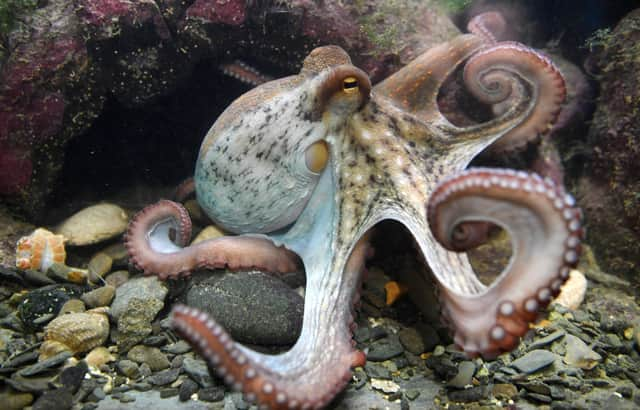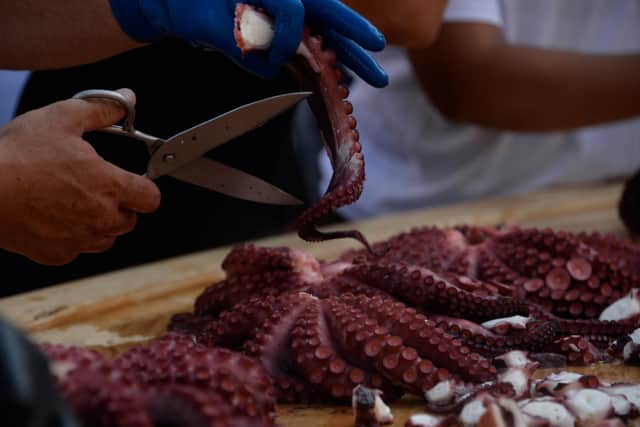Octopus farming is immoral, given everything we know about this highly intelligent and solitary animal – Philip Lymbery


They are remarkable marine cephalopod molluscs, in the same biological class as squid and cuttlefish and easily identified by their eight arms. They inhabit all marine habitats, ranging from tropical reefs to polar latitudes, where they are ecologically important species, being both carnivorous predators and an important prey for fish and marine mammals.
According to the scuba-diving philosopher of science Peter Godfrey-Smith, the octopus is “the closest we will come to meeting an intelligent alien”.
Advertisement
Hide AdAdvertisement
Hide AdIn his book Other Minds, he describes them as "an island of mental complexity in the sea of invertebrate animals”. The brain of a common octopus has 500 million neurons, making it as smart as a dog or a three-year-old child.
But unlike vertebrate animals, an octopus’s neurons are arranged throughout the entire body. These amazing creatures are “suffused with nervousness” – including the arms, which act as “agents of their own” – and sense by taste as much as touch.
As well as their eight arms, they have three hearts and blue-green blood. Masters of camouflage, their skin is embedded with cells that sense light, giving them an array of tricks for thwarting enemies.
They are boneless so can squeeze in and out of tiny spaces. They can match the colours and textures of their surroundings, enabling them to become near invisible in plain sight. They can escape at speed by shooting forward with jet propulsion. They can squirt ink to hide themselves and dull the senses of an attacker.


And if they lose an arm, they can grow it back. They have even been observed using tools and picking up discarded coconut shells and using them like mobile homes.
Few of us will have had the chance to observe them in the wild but many would have watched the now famous Netflix film My Octopus Teacher. This Academy award-winning film documents a year spent by filmmaker Craig Foster forging a relationship with a wild common octopus in a South African kelp forest. It has captured hearts worldwide.
“I think people around the world are yearning to have some kind of real connection with the natural world, and this film speaks to that need,” Foster said.
Despite that emotional portrayal of the unique bond between a human and an intelligent sea creature, demand for octopus as a food source and, in some cases, a delicacy has never been greater.
Advertisement
Hide AdAdvertisement
Hide AdWild-caught octopuses are consumed all over the world, especially in several Mediterranean countries in Europe, as well as in Asia and Mexico. Italy consumes the most octopus, at over 60,000 tonnes per year, but there has recently been high demand in other countries, including the United States and Japan. Overfishing, combined with this growing demand, is driving prices up, leading to burgeoning interest in the farming of octopus, notably in Spain.
In the rush to farm these “intelligent aliens", as Godfrey-Smith describes them, fears grow that both their welfare and the likely impact on the marine environment is being overlooked.
Many scientists and groups now argue that invertebrates are extremely intelligent and should be protected from suffering. Whilst there is currently no general welfare protection for cephalopods in Scotland, the Scottish Animal Welfare Commission (SAWC) noted that how they are treated has “begun to matter” to the public and the scientific community, and that the overall weight of scientific evidence in their own study supported the conclusion that cephalopods should be treated as sentient.
The SAWC went on to recommend that the Scottish government should consider whether the welfare and legal protections that have been afforded to vertebrates should now be extended to include cephalopods in all policymaking.
A new report, Octopus Factory Farming – A Recipe for Disaster, which was released last week on World Octopus Day, has also revealed how plans to expand factory farming would cause them to suffer greatly due to their solitary and inquisitive nature, and exposed the lack of any approved humane slaughter method.
Further, the carnivorous diet of the octopus makes farming them unsustainable and damaging to the environment. Octopus eat small fish and other marine life; their diet in aquaculture will most likely consist of fishmeal made from the fish that are otherwise eaten by bigger fish, birds and marine mammals. So rather than protecting the oceans, the farming of carnivorous species like octopus, as well as salmon and trout, would put yet more pressure on the oceanic environment.
When one starts thinking of them as individuals with personalities or indeed, after watching Netflix's My Octopus Teacher, most people would be upset by the plans to confine and farm these fascinating, inquisitive and sentient creatures. As intelligent and complex animals with large cognitive capacities, their lives would simply not be worth living.
At a time when we are trying to “build back better” and to protect biodiversity and the beauty of our natural world, there can be no doubt that major health and welfare risks are created when animals are kept in conditions that do not meet their natural needs and do not fit with their wild environment.
Advertisement
Hide AdAdvertisement
Hide AdThe farming of octopuses is completely at odds with everything we understand about this species and everything we know that is morally and ethically right.
We need to stand up for the world we want, because the way we treat those who are at our mercy is the truest reflection of who we are as individuals, communities and nations.
Philip Lymbery is global chief executive of Compassion in World Farming and a United Nations Champion of Food Systems. His is on Twitter @philip_ciwf
A message from the Editor:
Thank you for reading this article. We're more reliant on your support than ever as the shift in consumer habits brought about by coronavirus impacts our advertisers.
If you haven't already, please consider supporting our trusted, fact-checked journalism by taking out a digital subscription.
Comments
Want to join the conversation? Please or to comment on this article.
